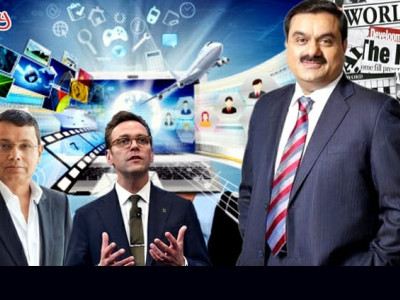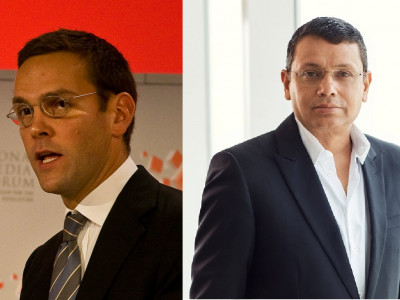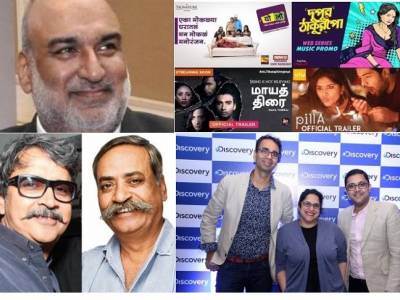Star India can be a USD 1-billion entity by turn of the decade: James Murdoch
At the recently concluded Asia Pacific Pay-TV Operators Summit, held in Bali between April 22-24 - 2015, 21st Century Fox Co-Chief Operating Officer James Rupert Murdoch said he expects Star India to become a one-billion USD company in terms of operating profit by end-2020.
I am sharing with you the quotes from James R Murdoch’s address at the APOS. In fact, together with James Murdoch’s quotes, if you were to look at Star India CEO Uday Shankar’s quotes (below) on various recent initiatives and his own beliefs on the way forward, I am hoping you agree it would make for an interesting story for your distinguished readers.
THE QUOTES, TRANSCRIBED FOR YOUR READY REFERENCE AND USE, ARE BELOW:
James Rupert Murdoch, Co-COO – 21st Century Fox:
"We love the India business. It has now evolved enormously from Hindi entertainment to regional language broadcasting and now we are a national platform. The sports business for us is a new pillar and we are looking at the business in a long term time frame. And if we keep innovating and investing in putting more creative and innovative content on screen, Star India will become a billion dollar EBIDTA by the turn of the decade."
STAR India CEO Uday Shankar's quotes and excerpts:
Media content has a huge role in shaping the sensibilities of the society and this role should not be underestimated:
“I am prejudiced towards aspirational content and cynical about cynical content. This is something we have always kept in mind while creating all of our content and is the same philosophy that we are bringing to sports as well. Sports has a huge role to play in empowerment, especially in a country like India, where we need to make the society believe that even an uneducated person can aspire to something greater if he is talented in a sport. This is what has worked with Kabaddi in a big way"
Philosophy behind content creation and regionalisation
"India is a giant country with varied cultures and tastes. We used Asianet as a beach head for the south and elevated the quality of content dramatically with sharper storytelling, involving the best of the creative fraternity and breaking the caste divide between film and TV. For logistic reasons outsourcing production might make sense, but unless you internalize the core creative skill, you will not be able to sustain success, which is why we have built a robust internal creative team to ensure this"
On sports:
"We have applied the same philosophy that we had in our entertainment business to sports - creating content with deep local affinity using the audience aggregation power that cricket gave you. Sports broadcasting has been plagued by laziness and lack of innovation, treated merely as a distribution agent of acquired rights which is what we have tried to change with multiple local leagues. If it’s your team that's playing you, even if it is not the best team, you would be deeply passionate about it. Creating a hierarchy of leagues across the country can be huge empowering phenomenon"
On hotstar
Our objective behind hotstar was quite simple actually - a lot of audiences were consuming our content on other screens, but we were unhappy with the inability to control their viewing experience. We realised we own all of this IP and so came hotstar. I do not think that this is a "free model". We need to keep the consumer at the centre while thinking about this and in a market like India, where data costs are still pretty high, the consumer is still paying a lot for the data - so it's not particularly consumer-friendly to have them pay twice, especially at such a nascent stage.
The reason I'm excited about the OTT space is because it allows for democratization of creativity. However this is not the same as saying that anyone can create content.
On big data and analytics
"At Star we use a lot of data and we value it deeply, however, let's not become data monkeys. Data helps understands patterns but to understand these patterns and take a leap to what should be created next will still require creativity. No matter how much data we have, I don't believe we will be able to automate the definition of the next blockbuster"
STAR India COO Sanjay Gupta's quotes and excerpts:
Lack of innovation stifling sports business economics:
'When there's a big sporting event, people congregate to watch in huge numbers, the only question is are there enough of these happening and how much innovation has been happening'
'Better engagement in sports will drive greater consumption. People don't look happy when they win a sports bid. Practices in the sports business have become quite toxic. Instead of a content creation business this has been run as a rent a cab business'
If I am league owner, chances are I'll squeeze more money from you than you can ever hope to earn.
That innovation we have tried to do is around Kabaddi and the response has been amazing. It was a short, high-intensity sport with vast local connect.
One if the challenges that we are seeing is that almost all of the investment in sports is going into rights cost. We are trying to change that by investing in basic sports infrastructure apart from rights, whether it was grooming the players for an on screen experience in Kabaddi or partnering to get the stadiums ready for ISL'
'Localization key to grow engagement':
'English movies and drama consumption is barely 2% of all content consumption in India. Sports needs to find a much more local strategy to make it relevant and to grow it'
People are queuing up to buy an EPL, a LaLiga or a Bundesliga, but the question here is how much engagement do these games actually offer as compared to relevant local content. We tried this with ISL and Kabaddi and the initial response has been very encouraging.
'Sports is a long haul business and it takes sustained investment to build something ground up'
We need to have a long term commitment to build a sport, a 10 to 20 years approach to build it ground up. Take the example of EPL which has been around for decades and has built an extremely strong consumer franchise, which advertisers are eager to associate with
3-year view of buying sporting rights has to change. This current regime disallows most of the partners to make money and disincentives anyone trying to build a sport.















Share
Facebook
YouTube
Tweet
Twitter
LinkedIn